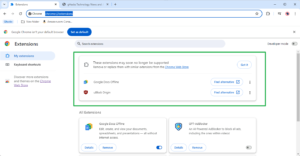Understanding the Upcoming Changes
When you update Google Chrome to the latest version, you may notice a new section when managing installed extensions. Google now displays extensions that may soon no longer work in Chrome. These are listed under a section called ‘Extensions that may soon no longer be supported’, visible at the top of the extensions page. You can check this by loading chrome://extensions/ in the browser’s address bar. If you do not have any extensions installed, there’s no immediate concern. However, if you do, some may stop functioning later this year.

Why Extensions May Stop Working
Google is changing the capabilities of browser extensions in Chrome. Older extensions that do not upgrade to the new system will stop working once Google drops support for the classic extensions system. This change affects content blocking extensions more than others. While content blockers will still be available, they may not offer the same functionality as the current generation of content blockers. Extensions no longer in active development may also stop working due to incompatibility issues.
What Users Can Do
Google started implementing these changes, called Manifest V3, in Chrome Canary 80 back in 2019. Since then, they have been added to all versions of Chrome but are not yet strictly enforced in the latest stable releases. Google suggests removing or replacing incompatible extensions, but there’s no immediate need to rush. It’s advisable to monitor these extensions as some may be updated to be compatible with the new system. If not, you can look for alternatives or consider switching to a browser like Firefox, which will support both classic and new extension systems.
Closing Thoughts
Google is pushing these changes, and other Chromium-based browsers such as Microsoft Edge, Opera, Vivaldi, and Brave will likely follow. It will be interesting to see if these changes will lead some Chrome users to switch to different browsers, especially if their favorite extensions stop working with no suitable alternatives. While this move may not significantly dent Google’s browser market dominance, it remains a relevant topic for many users. Feel free to share your experiences and any alternatives you’ve found in the comments below.

